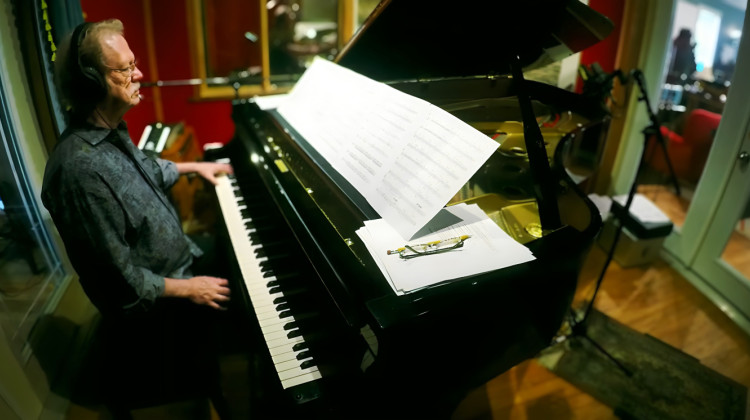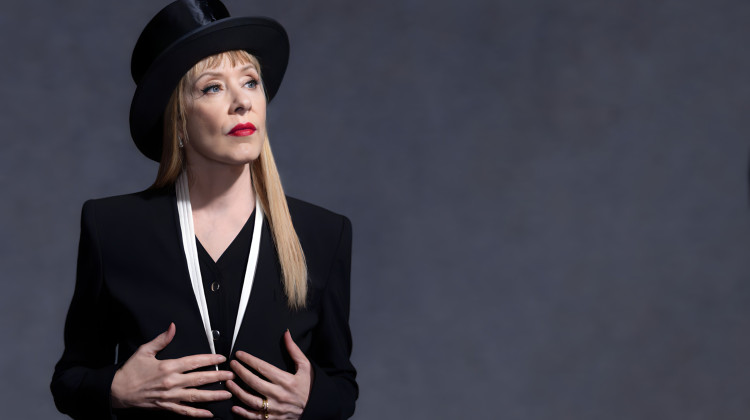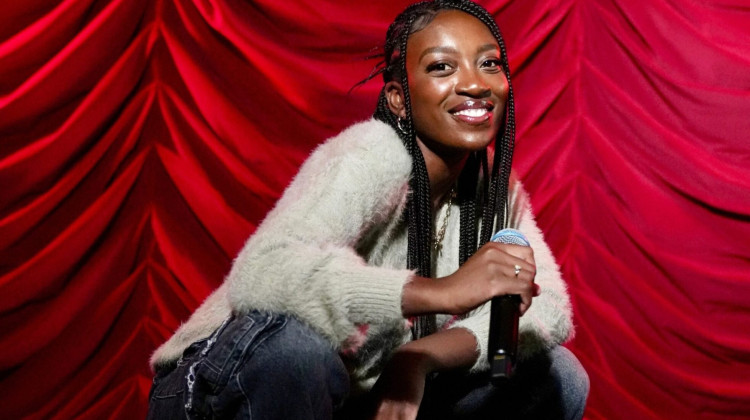Chris Thile is no stranger to WFYI fans. The MacArthur Fellow and Grammy Award-winning mandolinist was heard weekly on 90.1 FM during his four year stint hosting “Live From Here."
Thile will be performing in Indiana on Oct. 3, at Brown County Music Center in Nashville, Indiana. WFYI’s Kyle Long spoke with Thile ahead of the performance.
Kyle Long: Chris, I know WFYI fans will be pleased to hear from you, as you were featured regularly on WFYI during the four years you hosted “Live From Here." The show ended its run last year, in part due to the COVID outbreak. Sadly, I don’t believe you had a chance to do a final show. So I wondered if there’s anything you’d like to say to all the Hoosier “Live From Here” fans?
Chris Thile: First, I want to say ahoy to anyone for whom it was an enjoyable experience to check out the various musical and comedic meanderings that we indulged in on a weekly basis.
I just heard a quote from Johnny Carson that I'm obsessed with. He said that making an episode of the “Tonight Show” was like trying to change a flat tire while barreling down the freeway. Making “Live From Here” was just like that, but in the most joyful way imaginable.
I really miss y'all. It was such a joy and honor to have your ears, and I think we'll find another way to do something like that again. I'd love to get back in that car someday and change some more tires. It was so fun!
Long: Your performance in Indiana coincides with our Fall pledge drive at WFYI. Obviously, public radio has been a huge part of your life. In addition to hosting “Live From Here”, I think you hold the record for the most appearances on NPR’s “Tiny Desk” series.
Thile: I think I'm tied with my bandmate Sarah Watkins. She and I are neck-and-neck.
Long: Is there anything you’d like to share about the importance of public radio in your life, and why it’s important for public radio listeners to support stations like WFYI?
Thile: When have we been more desperate for what public radio gives us? I'm a child of public radio. The public radio programming on the station that I grew up with in San Diego is responsible for some of my musical omnivorousness. There was just so much going on, and there's always so much going on with public radio.
There are all these amazing regional programs too. I remember listening to "Music From The Front Porch" on WKMS when my family moved to Murray, Kentucky. We would listen every Saturday morning, and it was a hyper-personal selection of bluegrass, folk, and rootsy stuff. I hope we don't ever lose those sorts of shows.
The internet doesn't do that for us. The internet is almost like this faceless, nameless delivery person that drops the world of music at our doorstep with no map, or directions. A good public radio DJ is the opposite of that.
Long: You’ll be performing at the Brown County Music Center in Nashville, Indiana on Sunday, Oct. 3. You have a long history of performing in the Hoosier state. You made your first appearance in Indiana in 1996 at the Indiana Fiddlers’ Gathering, which is held annually at the Tippecanoe Battlefield in Battle Ground, Indiana. You were 15-years-old at that, does that concert stand out in your memory?
Thile: Yes! Oh absolutely, I think I did that festival twice,
Long: Yes, you came back with Nickel Creek a couple times.
Thile: That sounds right to me. It was an amazing experience. That was one of the first festivals I played after moving to Kentucky from Southern California. Thank you for that memory, that was so much fun.
Long: As I mentioned earlier, you’ll be performing at the Brown County Music Center in Nashville, Indiana. This area is famous for its connection to Bill Monroe, who purchased land in Brown County and founded the Bean Blossom Music Festival.
In addition to being the father of bluegrass music, Monroe is also recognized as a master mandolin player. I know Bill Monroe has been a big influence on your work, and you had a chance to meet him early in life. Tell us about your connection to Bill Monroe?
Thile: Bill Monroe is a person who sets an explosive example of creativity, and the importance of listening to the world around you, and letting it serve as a point of direction.
Monroe wore certain influences on his sleeve, but the way he put things together resulted in a new music that was so good that a bunch of other people started copying it. That's how a genre forms, a handful of truly inspired musicians do a thing so good that a bunch of people start copying it.
For me it's that spirit of Bill Monroe, that instinct to do something different. That is so inspiring to me.
Long: I have a couple more mandolin questions if you don’t mind. WFYI is based in Indianapolis, the home of the late Yank Rachell, who was known as the “mandolin blues man." I’m curious if you’ve ever listened to Yank Rachell’s music?
Thile: I just heard about him for the first time recently from, of all people, a wine importer! [laughs] I'm a huge wine geek, and this guy is a noted wine expert who also happens to be a huge music fan. He knew my work, and asked if I knew Yank Rachell. So now I am vaguely familiar with Yank Rachell. I haven't heard a whole lot of his music, but what I have heard is really intriguing.
Long: There’s one more mandolin player I wanted to ask you about. I feel like you have some interesting connections here with this musician.
Like you, he was a child mandolin virtuoso. And again like you, he was also an innovator on the instrument, and used the mandolin to explore complex forms of classical music.
I’m talking about the late South Indian electric mandolin player U. Srinivas. Any thoughts you’d like to share on his music?
Thile: Oh for sure, he's a titan. It's so sad that we lost him so young. Again, you're looking at someone like Bill Monroe who was thinking of a new sound. Srinivas took this instrument and completely reimagined it, and it's stunning when someone does that. His melodic sense was unparalleled.
Long: You have a new solo album out titled “Laysongs." This is truly a solo album, the music on “Laysongs” features just your voice and mandolin.
From the Punch Brothers to Yo-Yo Ma, you're known for group performance and collaboration. I get the feeling that collaboration is often the foundation of your music making. So I’m curious what inspired this solo work?
Thile: I've been meaning to do this for a while. I've always done a certain amount of solo touring, and I've made things called solo records, but generally with other people.
I did make a solo Bach record where I played the partitas and sonatas Bach wrote for solo violin. But that didn't really feel like a solo record, because you're working with this giant of music. That almost felt like a duo record that I was a very insignificant part of. [laughs] So this is the first time I've made an actual solo "solo record".
You mentioned my history of collaboration, and I do love that. If I'm yellow, and another musician is blue -- the green that results in collaboration is really thrilling. It's a surefire way to transcend yourself. As we bounce ourselves off each other, we learn things about ourselves and the world.
What happens solo in a solo performance, without those people to your left and right onstage, you turn the people in the audience into your bandmates. In fact, they have been all along, you may have just been ignoring them. Because that thrill of collaboration is so exciting, you sometimes forget everything else.
When I made this record, I took that idea into the studio, and I imagined collaborating with anyone who has ever been generous enough to lend me an ear over the years. Now that the record is done, it's time to get back into the concert hall to perform for the people who helped me make it, the listeners who I was thinking about the whole time I made this record. It's all coming full circle now.
 DONATE
DONATE







 Support WFYI. We can't do it without you.
Support WFYI. We can't do it without you.